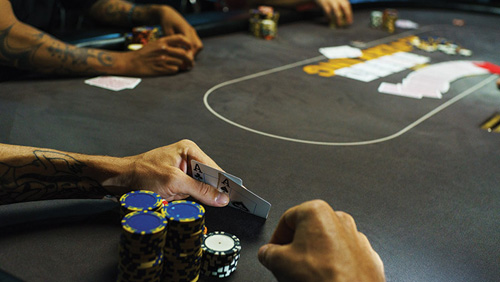Like lit up Christmas trees in the distance, from Thailand one can see the lights of the gambling parlors in Myawaddy, Myanmar, across the Moei River. This wouldn’t be newsworthy if it weren’t for the fact that gambling is illegal in Myanmar. Despite regulations, it is estimated that around 70% of Myanmar’s adult population gambles at some point. The strict controls, however, might soon fade away, as the country is exploring the possibility of legalizing gambling in an effort to attract more international tourists, according to a Nikkei Asian Review report.
 In Myawaddy, one of the illegal gambling dens serves customers on 40 different tables in a rudimentary game of Hi-Lo. The games don’t use chips like most casinos. It uses standard Thai currency, the baht. Bets range anywhere from about $3.20 to $9.60 per game with a roaring hush over the tables until someone makes a huge win. There are no ID checks – anyone and everyone is welcome.
In Myawaddy, one of the illegal gambling dens serves customers on 40 different tables in a rudimentary game of Hi-Lo. The games don’t use chips like most casinos. It uses standard Thai currency, the baht. Bets range anywhere from about $3.20 to $9.60 per game with a roaring hush over the tables until someone makes a huge win. There are no ID checks – anyone and everyone is welcome.
The authorities know that the gaming rooms are there, but chose to ignore them because the casinos are often jointly owned between militant ethnic groups and wealthy Thai citizens, according to the report. The Myanmar government has decided that a hands-off approach when dealing with the ethnic groups is the best approach. Ex-rebels now suit up as part of the Border Guard Force and help to maintain order along the borders. Upsetting the balance would not bode well for the government.
If Myanmar were to legalize gambling, a lot of the problems could go away. Much-needed revenue would be brought into local governments which could, in turn, provide the means to work with the armed groups in the remote towns. The move would also attract a great deal of tourism, which is always welcome, from areas such as Thailand or China.
While the subject of legalizing gambling is always a touchy one, there seems to be at least a lukewarm response on the part of Myanmar legislators. In February, a parliamentary session heard arguments from the hotels and Tourism Minister Ohn Maung discussing why the ban should be lifted. According to Maung, his argument may have touched a chord and it’s possible that there could be a change coming in the near future.